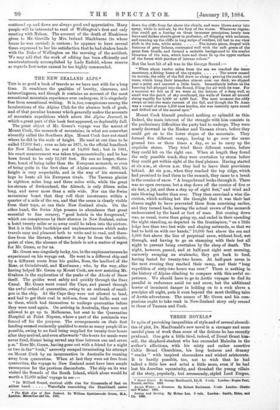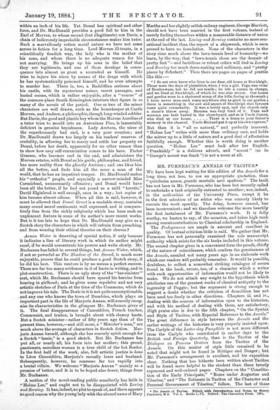THREE NOVELS.* IN spite of provoking inequalities of style and
of several absurdi- ties of plot, Dr. MacDonald's new novel is a stronger and more careful piece of work than some of the fictions he has recently pr3duced. One gets a little tired, indeed, of Donal Grant him- self, the shepherd-student who has succeeded Malcolm in the author's affections, with his misty and rather assertive Celtic Broad Churchism, his long lectures and dreamy "cracks " with inspired shoemakers and wicked aristocrats. It is hardly possible, too, not to wish that he had talked a little less and acted a little more, even if he had lost his Aurelian equanimity, and thrashed the young villain of the story, popularly, but erroneously, styled Lord Forgae,
• Donal Gran'. Be George MacDonald, LL.D. 3 role. London: Megan Paul, Trench, and Co. 1883.
Annan Water: a Romance. By Robert Buchanan. 3 rob. London : Ghetto and Windue. 1883.
Losing and Serving. By Holme Lee. 3 role. London : Smith, Elder, and Co. 1833.
within an inch of his life. Yet Donal has spiritual and other force, and Dr. MacDonald provides a good foil to him in the Earl of Morven, to whose second (but illegitimate) son Davie, a chain of ludicrously improbable circumstances makes him tutor. Such a marvellously rotten moral nature we have not come across in fiction for a long time. Lord Morven ill-treats, in a scientifically fiendish way, the lady who is the mother of his sons, and whom there is no adequate reason for his not marrying. He brings up his sons in the belief that they are legitimate, and one of them develops in conse- quence into almost as great a scoundrel as himself. He tries to injure his niece by means of the drugs with which he has systematically poisoned himself, and he even 'attempts to murder her. There is, too, a Radcliffian eeriness about his castle, with its mysterious noises, secret passages, and buried rooms, which is rather enjoyable, after a " course " of the common-place South-Kensington interiors that figure in so many of the novels of the period. One or two of the minor characters are well drawn, such as the housekeeper at Castle Morven, and Andrew, a philosophic, though long-winded cobbler. But Davie, the good and plastic boy whom the Marais Aurelius of a tutor tries to mould into an Antoninus Pius, is lamentably deficient in genuine boyishness. Lady Arctura, the niece of the superhumanly bad earl, is a very poor creation ; and Dr. MacDonald draws too largely on his readers' reserves of credulity, in allowing her to marry and settle her property on Donal, before her death, apparently for no other reason than to show how easy self-renunciation comes to his hero. Factor Graeme, who becomes earl in the end, and administers the Morven estates, with Donal aelhis guide, philosopher, and friend,
• has more reality than the ghostly Arctura ; and one likes him all the better, and finds him all the. more a man of the world, that he has an impatient temper. Dr. MacDonald makes his " orthodox " people, and especially a narrow-minded Miss Carmichael, unnecessarily offensive ; and Donal would have been all the better, if he had not posed as a mild "heretic." David Elginbrod is well enoukh, once in a way ; but copies of him become almost odious. When all this is said, however, it must be allowed that Donal Grant is a readable story, contains many sound moral sentiments well expressed, and is compara- tively free from the sickly religiosity which has been such an unpleasant feature in some of its author's more recent works. But is it too late to hope that Dr. MacDonald may give us a Scotch story the characters in which will refrain from preaching, and from wearing their ethical theories on their sleeves P Annan Water is deserving of special notice, if only because it indicates a line of literary work in which its author might excel, if he would concentrate his powers and write slowly. Mr. Buchanan has failed in several things, but Annan Water, which, if not so powerful as The Shadow of the Sword, is much more enjoyable, proves that he could produce a good Scotch story, if he did his best. This venture is by no means a perfect success. There are far too many evidences in it of haste in writing, and in plot-construction. There is an ugly story of the " bar-sinister " sort, which Mr. Buchanan should have spared his heroine from hearing in girlhood ; and he gives some repulsive and not very artistic sketches of Paris at the time of the Commune, which do not improve his tale. The Doric in it is not quite unexceptionable, . and any one who knows the town of Dumfries, which plays an important part in the life of Marjorie Annan, will scarcely recog- nise its characteristics in the glimpses Mr. Buchanan gives of it. The final disappearance of Caussidiere, French teacher, Communist, and traitor, is brought about with clumsy haste. But a Scotch minister—rather of fifty years ago than of the present time, however,—and still more, a "Minister's man," are much above the average of characters in Scotch fiction. Mar- jorie Annan herself, although she has scarcely spirit enough for a Scotch "lassie," is a good sketch. But Mr. Buchanan has put all, or nearly all, his force into her mother; this proud, passionate, merciless woman is a true child of the hot Border. In the first half of the work, also, full artistic justice is done to Leon Caussidibre, Marjorie's rascally lover and husband. Subsequently, however, he coarsens far too rapidly into a brutal villain. We welcome "Marjorie Annan" mainly as a promise of better, and it is to be hoped also fewer, things from Mr. Buchanan.
A section of the novel-reading public manifestly has faith in "Holme Lee," and ought not to be disappointed with Loving and Serving. It has, indeed, no plot to speak of, and there appears no good reason why the young lady with the absurd name of Mary Martha and her slightly selfish railway engineer, George Marriott, should not have been married in the first volume, instead of merely finding themselves within a measurable distance of union at the end of the last. Loving and Serving contains no more sen- sational incident than the report of a shipwreck, which is soon proved to have no foundation. None of the characters in the story rises much above the lawn-tennis level of humanity—we learn, by the way, that "lawn-tennis shoes are the despair of pretty feet"—and fastidious or robust critics will find in Loving and Serving too much dress-making and millinery, and "pretty pieces by Schubert." Then there are pages on pages of prattle hire this :— " I do not even know who lives in our dear, old home at Stockleigh. Those were the days of pluralities, when I was a girl. Papa was vicar of Hardenware, but he did not reside ; he left a curate in charge, and we lived at Stockleigh, of which he was also rector. Our house and garden were in a sheltered scoop of the hills, facing to the south ; I have never seen such roses anywhere else as grew in our garden ; there is something in the soil and aspect of Stockleigh that favours roses quite remarkably. It was a lovely spot, and the church only a stone's throw away. Mamma was very fond of it. Papa and mamma are both buried in the churchyard, and so is Uncle James, who died at our house There is a brass to your father's memory in the chtmcel. Uncle Richard put it up at his own expense.'
But then it is "all so natural," and perfectly innocent. " Holme Lee" writes with more than ordinary care, and holds the mirror up to a little of nature and a good deal of affectation faithfully enough. Whether this is worth doing is another question. " Holme Lee" must look after her English. "Prankishly" is a dubious adverb, and " accost " (as in "George's accost was frank ") is not a noun at all.



































 Previous page
Previous page